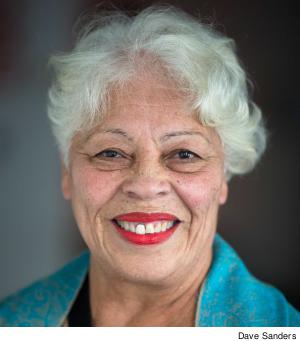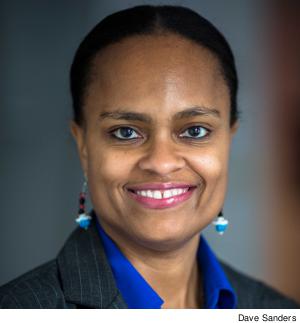An inclusive group of unionists
The PSC bargaining team spent months reviewing member priorities in crafting the contract demands. Below, several team members reflect on the process, and look forward to the next steps of bargaining with CUNY.
 |
 |
RAISING ADJUNCT PAY
If CUNY runs on the backs of underpaid adjuncts, then it is time to place that issue front and center for this negotiating cycle. On October 18, at the monthly scheduled meeting of our BMCC chapter, we broke up into small groups to vote on the issues we wish to have the bargaining team take up with CUNY management. Twelve out of these 13 break-outs made $7,000 per course per semester their number-one issue.
The majority who participated in these groups were full-timers. Their choice demonstrates that at BMCC we are united on this demand. We see it as a priority for the whole union. Salaries for contingent faculty must be addressed, and addressed now. There is no more important demand, especially given the skyrocketing rents and deteriorating public transportation system that compounds the difficulty that adjuncts have in making a living on the current paltry salaries.
Anthony Gronowicz
Adjunct, Political Science/History
BMCC
PREPPING FOR JANUS
The Supreme Court has agreed to hear the case Janus v. AFSCME, which seeks to invalidate state laws that permit the collection of agency fees or fair share fees from workers who chose not to become union members but still benefit from the job gains won by a public-sector union. This case is an attack on public-sector workers, an attack on their right to organize and bargain collectively for better wages and working conditions, an attack on their ability to enforce the contract they have won. At base, it is an attack on the very idea that there are some services – education, transit, health care, waste collection and more – that should be provided for the good of the people, not for profit.
In order to remain a strong union so we can beat back this attack, we must organize to get people in the PSC bargaining unit to become members, to remain members and to pay union dues. Our strength comes from having a large committed active membership and from having a healthy treasury.
The demands in the section “Union dues, membership information and reassigned time” will help us do that organizing. So that we can tell newly hired members of our bargaining unit about the gains the PSC has won and invite them to join, we need to know that they have been hired, and how to find them. We need to have time at new-employee orientations to begin this conversation. The PSC has adopted a new membership card, the blue card that has a separate signature for the member to authorize dues checkoff. We want to reaffirm CUNY’s adherence to that authorization. In order to effectively implement and enforce our contract, we are demanding an increase in our allocation of reassigned time.
Sharon Persinger
PSC Treasurer
Bronx Community College
MAKING CLT GAINS
In the last round of contract talks, we had a different administration when we started our bargaining in 2010. The city and state did not want to give any kind of package and they didn’t want to address retroactive raises. At this point in the upcoming talks, we see that it is a different climate, and we see what the settlements are at the state levels (two state unions have settled contracts with 2-percent annual raises).
The governor has political aspirations, too, so maybe he’ll be a bit more cooperative this time. We’re looking forward to strengthening gains for the higher education officers we made in the last contract.
We want to see something happen with the college laboratory technicians. They’re the lowest-paid full-time employees in the unit. We have to fix the question of the inequality in salaries. With the CLTs, they’ve also had an increase in workload. We need to have a gain for the CLTs.
I’ve been on this team for a while. The process is good, there’s committee work, there’s consultation, we’ve been talking to members throughout the process, we’ve been having meetings at different campuses, there was a survey that went out that identified what was most important for members. We’ve been very transparent in the process, and inclusive.
Iris DeLutro
Senior Coordinator
Murphy Institute
A PERSONAL FIGHT
I am the third generation of my family to both graduate from and work at a CUNY school, but the first time I recall hearing about the PSC was as a student at the Graduate Center. My mother met me in the hallway very excited – the union had just won a victory and it wasn’t for full professors, the group of which she was a member. It was then that I realized the uniqueness and inclusiveness of our union.
For me, both the most interesting and challenging part of being on the bargaining team is the many different constituencies that you work to serve. Much of what we do lies in the space between meeting the needs of each one of those groups and supporting the functioning and unity of the union as a whole. Every design, discussion and disagreement is built on the foundation that all of us together make up one union and that only together can we keep it strong.
I am looking forward to the day when I can go back to Guttman with that same excitement my mother had, and share with them the victories we’ve all won together.
Alia Tyner-Mullings
PSC Chapter Chair
Guttman Community College
YEARS OF LOSSES
The 1970s and 1990s were devastating decades for CUNY salaries. In those two decades, most titles’ salary steps lost between 40 and 50 percent of their value. If our salary steps had stayed even with inflation, today our salaries would exceed or be comparable to Columbia and New York University. And adjunct lecturers would start at $5,000 per course per semester. We still suffer from the legacy of the 1975 financial crisis and the Pataki years. Since 2000, despite two major recessions, we basically stopped salary erosion and made equity salary and benefits gains. In this contract, we must fight to reclaim lost ground for all faculty and professional staff, both full- and part-time.
Another central demand is to bring the increasing use of online learning under the control of faculty. New studies show that distance learning, when compared to the traditional classroom, is less effective for “at risk” students, is more costly, takes more faculty time to deliver and is more expensive for students. Many of our members know how and when to use educational technology properly. We need contractual guarantees now so that we can control the use of educational technology for our students’ benefit, instead of for the profit margins of private corporations or managements’ misplaced attempts to cheapen the delivery of education under current austerity budgets.

